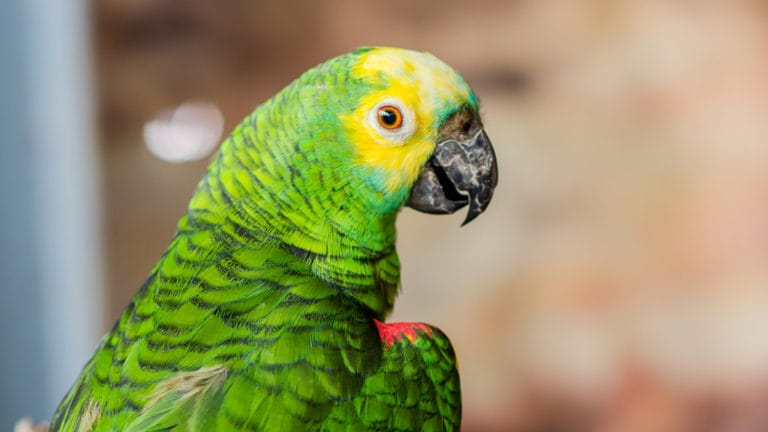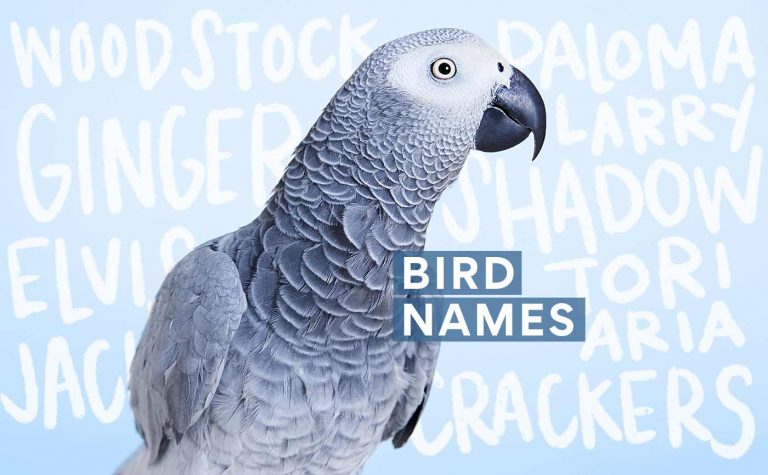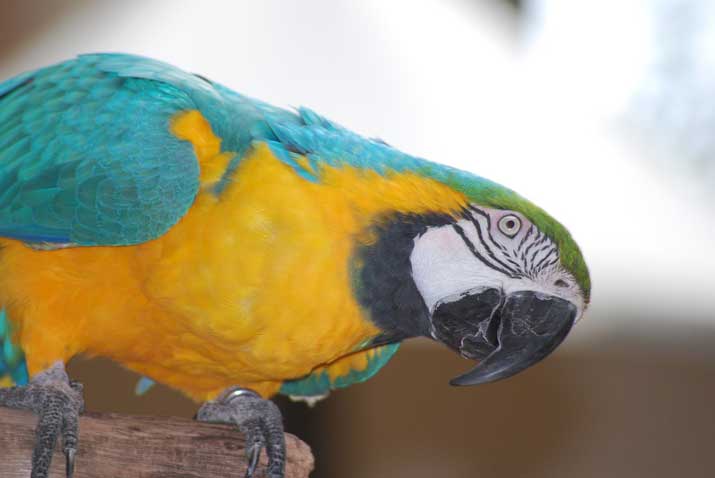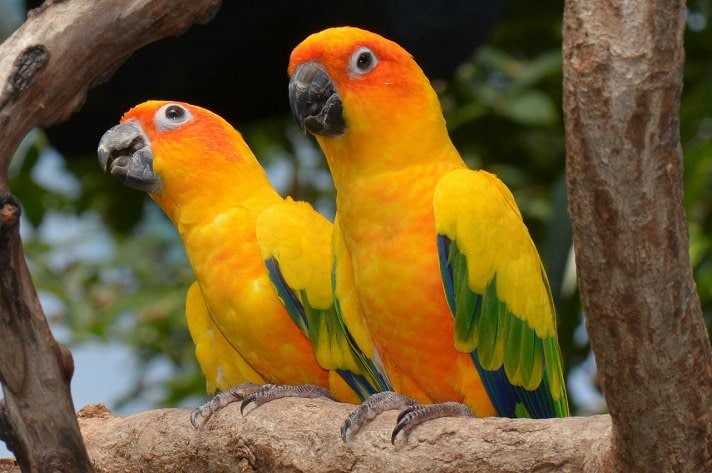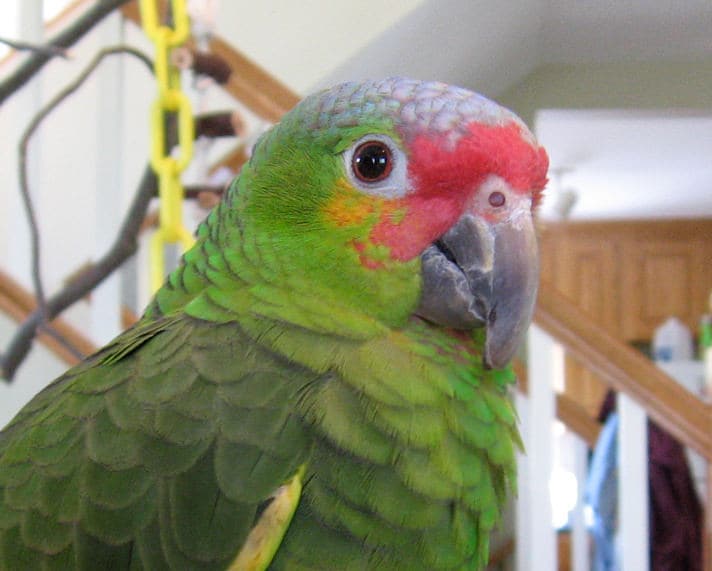Talk It Up With The African Grey
“African grey parrots have a reputation for being smart and not loud,” said Mattie Sue Athan, an International Association of Animal Behavior Consultants (IAABC) certified parrot behavior consultant, and award-winning author of the book, “The Well Behaved Parrot.”
Athan said that independent play is important in fostering balanced vocal abilities. “The development of independent toy play during the period of intense learning between fledging and the onset of sexual maturity is the key to a well-adjusted adult African grey parrot. An African grey that doesn’t learn independent toy play by the age of 6 months can vocalize excessively and develop feather destructive behavior by the age of 9 months.”
Colleen Fresco of New Jersey has had her African grey parrot, Rocket, for nearly three years, and is still amazed by his ability to learn new words on a weekly basis. She said that he has the ability to cleverly invent new speech. “One day Rocket spied me with food and said, ‘Want some.’ I told him ‘Rocket, go eat your bird seed.’ He persisted with ‘want some,’ and I still didn’t respond. Then he started doing what I call food flips in his cage. He climbs up the front of his cage, goes across the top and comes down the back of his cage to his perch. He could see that his antics weren’t working (they usually do). I told him to eat his parrot bird food, again, and out of desperation, he said, ‘Want Colleen’s . . . pleeeeeease!’ I was astonished. He knew how to say my name, but only said it to call out to me. He had also never said please before. Needless to say, Rocket got what he wanted!”
Pamela Anthony of Pennsylvania has a male Congo African grey, Dave, that is also a cognitive talker. “Our little lovebird, Jimi, was flying in circles around the living room and had trouble finding a place to land. After about four or five revolutions Dave said, ‘Whatsa matter?’” Like many talking birds, Dave calls to Anthony when he wants something. “One day, he made his own joke by mixing ‘whatsa matter’ and my name, coming up with ‘whatsamamala,’ followed, of course, by laughter. He knew he made a joke.”
Myra Dashner of Wisconsin has a 3-year-old Congo African grey, Eeyore, with a vocabulary of more than 300 words. “Before I even brought her home from the pet store she would say ‘Hello’ to me every time that I visited her — she was 4 months old!”
She also speaks in different voices, mimicking her, her husband and even the TV. “She learned the ‘Cops’ theme song (‘Bad Boys, Bad Boys…’) and now if we sing the first verse she’ll pick up the second.”
Speak Easy With Quaker Parrots
Though only the size of a cockatiel, quaker parrots are as vocal as the largest African grey. “We live with six quakers; some talk and some do not,” said Jon-Mark Davey, who runs and operates a quaker parrot information website and co-authored “Parrots in the City” with Mattie Sue Athan. “Stanley, my 13 year old, is a ‘closet talker.’ His favorite time to speak is when the cage cover goes on and the lights go out.
“Most nights he will recite his favorite words and phrases speaking with a very clear voice. When the TV is too loud or my wife or I laugh too loudly he will scold us to ‘Go night-night,’ and grumble at us for waking him. His vocalization is very clear and to the point.
“Skippy, our blue female quaker, likes to make barnyard-animal sounds and will tell the other birds to ‘Step-up’ when she thinks I should pick one of them up. One day my wife put Skippy’s treat food into her cage, and she looked up and said ‘Thank you.’ ‘Thank you’ had always been used for kisses, not food; somehow, she understood the meaning.”
Davey emphasized that not all quaker parrots talk. “They will speak when they wish and say what they want to say, the timing is theirs. Speak to your birds as if they understand, they just may surprise you.”
Ryan Williams of Alberta, Canada, has a 10- year-old quaker named Gracie with a vocabulary of about 500 words. “She seems to know what she is saying. She knows when she is ready for bed and will say, ‘Gracie tired, time for bed’ and ‘Good night’ as we cover her cage. She also says ‘Good morning’ when she is ready to be uncovered.” She has a sweet and playful vocabulary, which includes “Where’s my kiss” followed by smooching noises. She also knows what she doesn’t like. “When the other birds are screaming Gracie says, ‘Give it a break!’”
“They have an amazing ability to mimic any and everything that sparks their interest,” said Meghan Kilgrew of Massachusetts. She has a 3-year-old male quaker, Jade. “He has associated certain actions with specific words and uses them together. For example, after pulling out one of my earrings he will yell, ‘Let go!’ He often entertains himself by asking, ‘Do you understand the words that are coming outta my mouth?’ He then bobs his head up and down saying, ‘Yeah … Good boy.’”
“He is quick to notice if someone is getting ready to leave and as they walk out the door he says ‘Bye-bye’ over and over again. When Jade gets nervous he comforts himself saying, ‘It’s okay, it’s okay.’ “Our family is constantly entertained by Jade’s antics. He’s our ‘little green trouble-maker.’”
The Best Parakeet Chatter: The Budgie/Parakeet
Perhaps no bird is chattier than the budgie/parakeet. In fact, a budgie/parakeet, named Puck, has been listed in the Guinness Book of Records as the “The Most Talking Bird” with a vocabulary of more than 1,700 words!
“Male budgies are one of the best talkers available to companion bird owners,” said Diane Grindol, who writes the “Small Birds” column in BIRD TALK and is the author of “Teaching Your Bird to Talk.” She recommends that you take time to talk to your pet budgie and to expose your bird to radio and other media from which it can learn.
“Two considerations regarding budgie talking ability: females don’t talk, and most budgies talk in a high-pitched, fast voice so you’ll need to listen carefully to catch what they’re saying. Budgies are underrated pets with much to recommend them, and offer many challenges to the involved companion bird owner.”
Cheryl Mcaleese of New Jersey and her budgie, Pipsqueak, have been members of the Budgie Research Group since May 2003. “Pipsqueak, as well as my Mom’s budgie, Ditto, have recorded hours of conversational talking. While it’s true that at times they’re speaking so fast, and/or so softly, it’s hard to pick up every word in real time, hours spent listening to the recordings will enormously enhance one’s ability to hear all they have to say.”
Erica Rellis has a 4-year-old budgie named Tweety with an amazing vocabulary. “He even makes up his own phrases, like ‘Tweety is a gorgeous, gorgeous, scary little blue baby monster.’ ‘Scary’ and ‘monster’ were learned from my grandchildren who are afraid to go into the basement.” Unfortunately he also picks up some words and phrases he shouldn’t. “One day I was angry at my husband and called him some bad names. Soon I heard this little innocent voice on my shoulder repeating what I had just said.”
Being “owned” by two budgies, Buddy and Lexi, made Cheri Collin of Maine realize how unaware people are of these parakeet’s abilities. “When I have guests at my apartment, they’ll often glance over in the corner and say, ‘Oh, what cute birds!’ They’ll stand there and watch them for a few minutes and almost all of them trip over themselves once they hear Buddy open his mouth and utter a few phrases. Nor do they know that they can understand the emotional context of a situation and respond accordingly. I’ve broken down near the birds’ cages and vented my frustrations only to have Buddy climb down to my eye level, listen to every word, then kiss my lips and say, ‘I love you, you good baby girl.’”
Other great talkers include:
- Amazon parrots
- Eclectus parrots
- Indian ring-necked parakeets
By: Anton Souza
Featured Image: Via ceazars/iStock/ThinkStock
Share:

